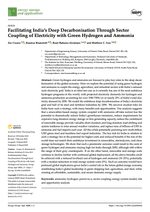Advances in genomics and computing are transforming the capacity for the characterization of biological systems, and researchers are now poised for a precision-focused transformation in the way they prepare for, and respond to, infectious diseases. This includes the use of genome-based approaches to inform molecular diagnosis and individual-level treatment regimens. In addition, advances in the speed and granularity of pathogen genome generation have improved the capability to track and understand pathogen transmission, leading to potential improvements in the design and implementation of population-level public health interventions. The authors outline several trends that are driving the development of precision epidemiology of infectious disease and their implications for scientists' ability to respond to outbreaks.
Precision epidemiology for infectious disease control
01 February 2019
Other Recent Journal Article / Working Papers

Water temperature regulations could help to balance biodiversity and energy security

An aspirational approach to planetary futures

Resolving Uncertainties in the Legality of Wildlife Trade to Support Better Outcomes for Wildlife and People

Protect the Integrity of CITES: Lessons From Japan's IWC Withdrawal to Keep Polarization From Tearing CITES Apart
Controlled Catalysis Delivering High Molecular Weight Polyesters as Recyclable Alternatives to Polystyrenes

Facilitating India’s Deep Decarbonisation Through Sector Coupling of Electricity with Green Hydrogen and Ammonia